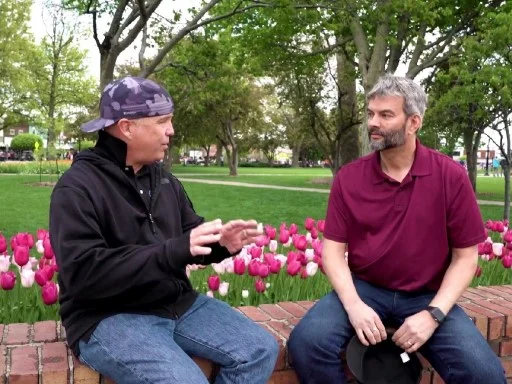Me: You talked a little bit about using questions to engage others in conversation. I know through our friendship that you have been involved in evangelism and sometimes even with some high-profile atheist. It can be a real challenge to manage the conversation without coming to blows or becoming argumentative. That is a key skill in evangelism, to manage the conversation. How do you approach those situations and keep both parties engaged?
Tony: I would say, it depends. Another joy of evangelism, as a lifestyle, is that every encounter is unique because every individual is unique. So, I customize my presentation of the gospel to that unique individual. I’m not a big advocate of cookie cutter scripts, like you say the same thing, sharing the gospel every time you talk to somebody. It really depends on the person and how the Holy Spirit leads, there are a million different ways to share the gospel. You could share one nugget of truth to one person, a completely different nugget to another person, and that’s it.
As you mentioned, some of these high-profile or very astute atheists, they really do know their stuff and are very smart, smarter than me. How can I have any confidence going up against these intellectuals that know their science a whole lot better than I know my science. Often, they’ve thought through most of the philosophical ramifications of religion and eternal things more than I have. How can I have any confidence or assurance to go up against these people?
I know that the simple gospel, that John 3:16 gospel, is simple enough for a seven-year-old child to believe and be saved and is deep enough and powerful enough to convert the most rabid atheist. I’m not ashamed of the simplicity of the gospel. I do believe that the gospel is not only simple, but it is deep as well. It is unending, we’ll never plumb the depths of the gospel of Jesus and all its ramifications in our lifetimes. Therefore, my confidence is between me and God. I could come against 100 atheists, they could surround me, but my i know that with me and God we are the majority. We’re not going to lose.
Me: Like Elijah and the prophets of Baal.
Tony: Exactly. My confidence is in God and God is sovereign. He’ll take care of me and if that means he allows me to get beat up or whatever, then I know that’s for my good and it’s a learning experience. I really think that a lot of Christians have a fear of sharing their faith. That’s probably the number one stumbling block. When you ask a Christian, “Why don’t you share your faith?” Fear. Fear. Fear of what? fear of man? fear of being made to look stupid? What I’m saying is that I have that fear too but what overcomes that fear is a love for God and His glory, and a love for and compassion for people, and the great confidence in the power of the gospel.
I really think that we don’t have to have a fear as we go out and share our faith. We just share the gospel. Again, learning apologetics is very helpful, but I would encourage people who don’t know any apologetics to share the faith. I would not tell them to wait until you learn apologetics before you share your faith. No, I would say, if you’re saved, you know enough to go out and share the gospel because you know enough to believe the gospel in order to be saved.
Me: You shared an example from when you were younger, as well.
Tony: Right. As far as guiding the conversation, having a game plan is essential. I do know where I’m going, I know certain essential elements of the gospel. Gospel means good news, but the good news starts with the bad news, so I must talk about their sin. How do I bring about the knowledge of sin to them? I use the Law like Paul did. The Holy Spirit can convict them of their sin because of their conscience, God’s law is written on their hearts. The Holy Spirit will use their conscience to convict them. Next, I get into the good news about who Jesus Christ is and what He did for us, His substitutionary work on the cross and His resurrection from the dead. That’s the gospel content. The bad news and good news together. Then, what should be our response to that gospel? God is looking for repentance and faith. He’s looking for a turning from sin, turning to Christ and a trust in who He is and what He has done for us. I have that kind of big picture overview of where I’m going.
And I think a lot of Christians don’t, maybe just from lack of really thinking it through. When they get into the conversation they don’t really know where to go next. They don’t know what to say or what questions to ask. They’re not sure what comes next. Having a path that you’re walking down is helpful.
Me: I can concur. I know when I first started in evangelism, before I had any training, I was at the booth and I’d answer questions, but because I didn’t really have a game plan of where I wanted to go, it mostly was just answering questions. Knowing that it’s about winning souls, about communicating and proclaiming the gospel of Christ, that really made a huge difference.
Tony: I think another key element and what I teach other Christians in evangelism comes down to communication and interpersonal skills. I find that a lot of Christians have the desire, the God given, Holy Spirit driven desire, to share their faith. Some people are naturally friendly, like your salespeople. They are naturally outgoing and can strike up a conversation with almost anyone. But there are even some of those, when it comes to spiritual things, they kind of freeze up. I share interpersonal skills, how to read people, how to watch people in their reactions and responses. For example, when they cut the conversation short. You know then the person is not interested in what you’re saying and you’re just being obnoxious or rude or annoying to them by staying too long in the conversation. That’s a big one, I run into this a lot. A lot of Christians have the idea, I don’t know whether they’ve been trained or taught this somehow, that if I don’t get through the whole gospel presentation I have failed. It’s wrong to think if I get to talk about sin and only started to talk about Jesus and they had to leave then I’m a failure. That’s how a lot of Christians feel, so I have to teach them that it is not the case. When you plant one little seed that is success. In fact, you don’t even have to plant seed. Let’s say you’re simply trying; your effort is well-pleasing to the Lord. Ultimately our number one goal of evangelism is to exalt Christ. Then it’s to win the lost. We want Christ to be pleased with us in the whole process.
Another major thing is asking questions. You can have people who aren’t salespeople and they don’t realize that you can really manage a conversation well. You can guide it gently by asking the right questions at the right time. Having a whole boatload of questions at your fingertips is a great help to start the conversation. It’s a great help to lead it. It’s a great help to end the conversation. Questions are really helpful.
Part 1: Profile
Part 2: Booth Ministry
Part 3: Apologetics
Part 4: Using Doctrines
Part 6: Resources
 The Church’s Search and Rescue Mission
The Church’s Search and Rescue Mission
 Evangelism Interview with Eddie Roman: Closing Thoughts and Encouragement
Evangelism Interview with Eddie Roman: Closing Thoughts and Encouragement
 City of Refuge Pamphlet
City of Refuge Pamphlet
 Tulip: The Beauty of God’s Grace
Tulip: The Beauty of God’s Grace